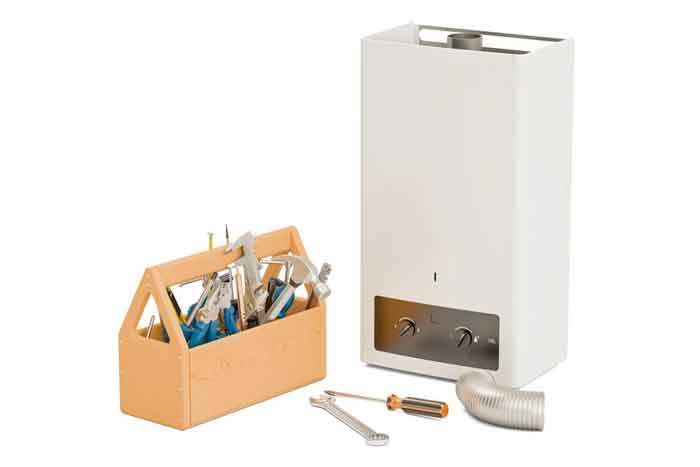Disclaimer: This post may contain affiliate links, meaning we get a small commission if you make a purchase through our links, at no cost to you. For more information, please visit our Disclaimer Page.
As a society, we are pretty unaware. We take long showers, we fill up the bathtub all the way, we let the water run while we’re brushing our teeth. All of these things require hot water. And that hot water needs to be heated somewhere.
As we know, the water is heated in a water heater. It's impossible to function without it; therefore you need to seriously consider all of the pros and cons when you're looking to purchase a heater. It could be said that the water heater is one of the most essential parts of a bathroom.
There are the usual two types of heaters: conventional and tankless. In this article, we will look into the tankless heaters, and more specifically the difference between electric and gas tankless water heaters.
Tankless water heaters, although higher in installation costs than conventional ones are a better option for your house because primarily they save time and energy.
Furthermore, they can be mounted anywhere, there won’t be any leaks, mineral buildup or corrosion (because there’s no tank!), and because they only use energy when the hot water is needed, you will save on money too!
Now as we’ve established just a couple of reasons for why the tankless heaters are better than conventional ones, we will now see whether you should opt for a gas or an electric tankless water heater.

gas vs electric tankless water heater
Gas Water Heaters
In terms of initial installation, gas tankless water heaters cost more than their electric counterparts. Gas heaters won't be less than a $1,000 especially if you want a more high-quality brand; it will cost even more.
One of the main reasons it is more expensive is because you need proper ventilation. However, after installation, the ongoing operating costs will be almost the same for both types.
Moreover, gas water heaters are significantly bigger than electric ones. Nevertheless, they are still smaller than conventional water heaters. Gas tankless water heaters will require annual maintenance. Not to mention that they produce greenhouse gases and increase reliance on fossil fuels.
On the other hand, they are a better option for those living in cold areas. Because it will take them less time to heat up the water than electric water heaters.
There are two types of gas tankless water heaters depending on the type of gas it uses: propane and natural gas.

Propane Tankless Water Heaters
Propane tankless water heaters have greater capacity and heating ability than electric water heaters. Installing vents needs to be done properly. If you live on a higher altitude, you will need additional installation work done.
This is due to the fact that propane will not burn cleanly and will, therefore, produce carbon-monoxide into the atmosphere.
Propane is more expensive than natural gas, and yearly maintenance is highly recommended.
Propane tankless water heaters are a good choice if you don’t have natural gas in your area.
Natural Gas Tankless Water Heaters
Tankless gas water heaters that use natural gas are much lower in price than electricity and propane water heaters. They are more efficient than electric water heaters as well. It must be noted that natural gas is not available in rural areas – in this case, propane is a better choice.
Natural gas water heaters are less likely to need upgrades to existing utility services.
In contrast, in other aspects, natural gas water heaters function in the same way as propane ones. They need proper venting installation; they will also need additional work if they are installed on high altitudes because of the same reason mentioned in the previous section.
Although the current price of natural gas is quite low, it is predicted that the price will become higher in the near future – due to the environmental factors and the existing quantity of natural gas.
The main advantage of the natural gas water heater is that it is a great solution for very cold areas and large families due to its high capacity and great heating ability.

Electric Tankless Water Heaters
If, for whatever reason you feel more comfortable with electric tankless water heaters, then read on.
The price of electric tankless water heaters is much lower than their gas counterparts. They go for $500 to $700. The installation will also cost you less than if you opt for a gas water heater. It will also boost existing systems.
They are very eco-friendly. They will be 100% eco-friendly once the new electricity generation comes from sources such as solar, wind, and wave energy. Nevertheless, electric water heaters are still more eco-friendly than gas water heaters.
Electricity water heaters are much smaller than gas ones, they require little to no maintenance and you don’t need any kind of venting situation.
Conversely, they are quite lower in capacity and heating ability aspect. It will take them more time to heat the water up so they are not an ideal solution for colder areas. Moreover, they are also not as ideal as a whole house water system for large households (the electricity bill will skyrocket!).
Additionally, they might need expensive upgrades or reparations.
However, they are a great choice if you want to boost just one fixture, such as a hot tub or a washing machine. If you live in hot or warm environments it will be more than enough for you.
It is good for increasing hot water service to a remote location such as a guest house or something similar.

Things to Consider When Choosing a Tankless Heater
You will need to consider a few things before you decide on which type of tankless water heater to buy. You need to remember that even if you’ve seen amazing reviews for, let’s say, electric heaters, that does not mean it would be an ideal solution for your household.
Firstly, you will need to find out:
- What utility service is available for your home (gas, or electricity)?
- What is the temperature of the groundwater in your area?
- What are your household water-flow needs?
- Which one is safer for you and the environment?
Utility service
Some homes only have gas, while others don't.
If you have both gas and electricity then you can freely choose between the two.
Moreover, be aware that if your home does not have natural gas, you will have to opt for propane or an electric tankless water heater.
Groundwater temperature
If you live in areas with colder temperature, your water heater will need to work harder than if you live in an area that has a warmer climate.
This is due to the fact that if the groundwater temperature is low, there will be a requirement for a greater water temperature rise.
If where you live is cold, it would be a better option would be to choose a gas water heater because they have greater heating capacity.
Household water use
Another thing to consider is how big your household is. If you live in a family of 5, there's a chance that various water fixtures will be running at the same time. Someone is showering; the other one is doing the dishes and so forth.
Tankless water heaters are sized by rating its temperature rise at a given GPM (gallons per minute). So, in this scenario, you will need to look up the water flow rate of each water fixture (the information is available online) and approximately calculate which tankless water heater to buy.
Maybe you live alone, but you would like to shower, to have the washing machine and a dishwasher running at the same time. You need to consider all of these factors and look for a tankless heater that has that capacity.
Environment and safety factors
Some simply don't particularly like the idea of having a gas water heater, for various reasons. One of the reasons is that gas, of course, is highly flammable.
Moreover, it must be emphasized that electric water heaters are far more eco-friendly than their gas counterparts. Gas water heaters emit greenhouse gases into the atmosphere and they still rely on fossil fuels.
Conclusion: Gas vs Electric Tankless Water Heaters
To conclude, both gas and electric tankless water heaters are quite attractive options. However, there are other factors to consider other than what you personally prefer. Some of them are what it costs to install and maintain, which one will heat the water more quickly, etc.
Tankless water heaters are an economical and frugal option for many households.
Bearing in mind all of this information, natural gas tankless water heaters are good for those who need larger water heating capacity. In contrast, their electric counterparts are good for small households, and increasing existing waster systems.
I hope this article has provided enough information for you to make a choice. If you need help installing a water heater, click the banner below and enter your zip code.
